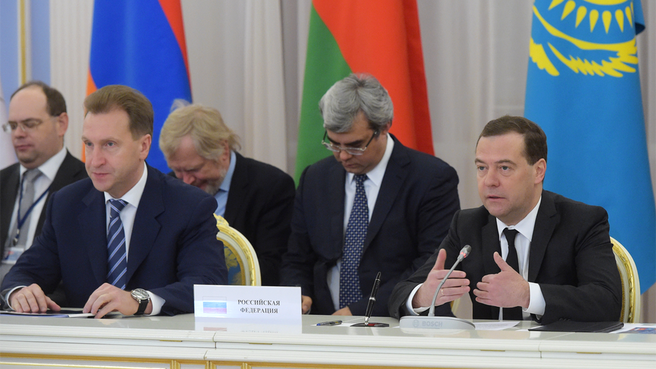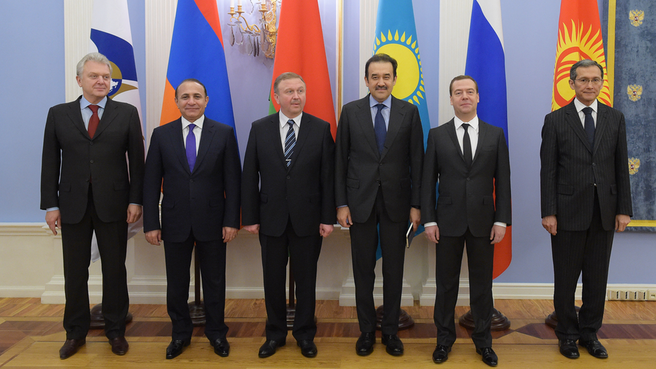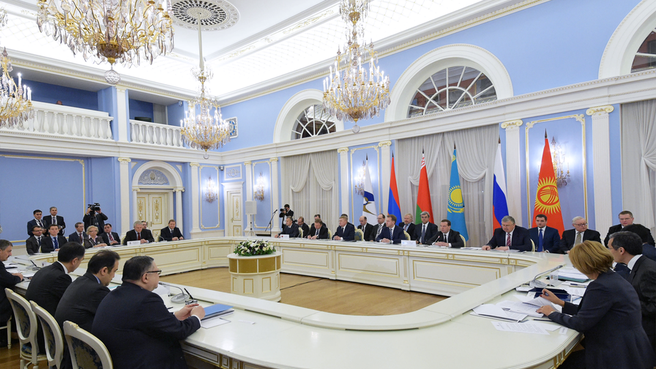Dmitry Medvedev’s opening remarks.
Excerpts from the transcript:
Our Union started working on 1 January. This opens new
opportunities for the stable, balanced development of our economies. Businesses
will be able to operate according to universal rules. Conditions will be
provided to boost the flow of trade and investment.
Today we are holding the first session of the Eurasian Intergovernmental Council, one of the leading bodies of our association. In this format, we will make the bulk of decisions to regulate economic activity and cooperation within the framework of the Union.
Our Union is making its start in a situation that is far from simple. No sooner had we recovered from the global crisis of 2008 than we encountered new difficulties. Our structural economic problems – all of us have them – have been compounded by plummeting oil prices and unprecedented outside pressure.
On the national level, our country is taking essential measures to ensure macroeconomic and social stability. We realise the importance of this anti-crisis work, considering the close cooperation that exists between Russian, Belarusian, Kazakh, Armenian and Kyrgyz companies and enterprises.
Efforts are being made to boost the capitalisation of banks. To this end, we have funneled significant funds into the Deposit Insurance Agency: 1 trillion roubles. A decision has been made to allocate 830 billion roubles to support 27 banks. The volume of state credit guarantees for the goods-and-services sector has been increased. Conditions are being provided to support specific sectors, including agriculture, and innovation projects.
In the next year or two we will need to adapt to new realities. However, regardless of the market situation, Russia remains a country open to all our partners, and it is determined to honour its international commitments. Our integration goals remain immutable, and our Union Treaty provides an optimal set of instruments for achieving them.
This year we will draft and adopt a new Customs Code, an agreement on the procedure for signing international treaties within the Eurasian Union, concepts for the creation of a common electricity market, a natural gas market and an oil and petroleum products market: in all, over 100 documents.
Special attention will be given to bolstering the Union’s institutional foundations on principles of trust, equality and consideration for mutual interests, eliminating the remaining trade barriers, acting on plans to adopt a coordinated industrial policy, launching joint projects and facilitating the operation of common markets.
Integration provides us with such opportunities but how we use them directly hinges on our work toward ensuring the four fundamental freedoms: the movement of goods, services, capital and labour. These goals are the priority of the current Belarusian chairmanship in 2015.
Today there are six practical matters on our agenda, including approaches to the development of trade and economic cooperation between the Eurasian Economic Union and its principal partners. Involvement in the global economic agenda requires us to enhance our competitiveness and take a more active role in the international division of labour, taking into account our objective economic needs and interests.
Another matter concerns the financing of a pilot project to introduce the so-called marking of goods. The light industry market is capacious and contains a significant share of import. For understandable reasons all sorts of black and gray schemes are being actively used there. Therefore we need to develop a coherent, clear-cut administrative procedure and then promptly extend the marking of goods to other categories.
Today we will also consider the development of a concept for the Eurasian Engineering Centre for Machine-tool Manufacturing. Its creation will expand the possibilities for interaction between enterprises and will help more effectively achieve high-tech upgrade and modernisation goals.















